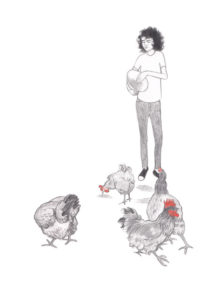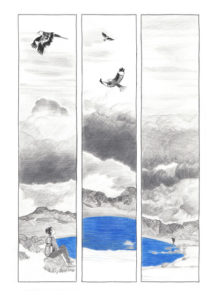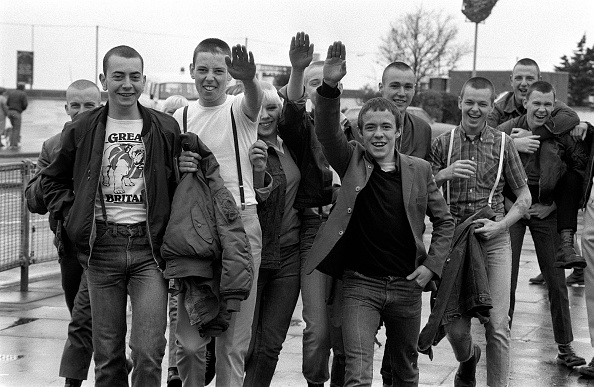Skinheads were everywhere in Seventies Leeds. Credit: Michael Daines /Mirrorpix/Getty

“Growing up between Leeds and Bradford in the Seventies, everyone at my school seemed to be, at best, a casual racist and, at worst, an active member of the NF.”
Una, the graphic novelist and artist, grew up in the same world I did. I spent my youth in a small, white town in the northeast during a deep economic recession; the only work available was in a very gloomy factory, 20 miles away. Racism was creeping and insidious. The National Front would recruit by standing outside our sink school and handing out leaflets, with headlines about immigrants “taking the jobs” of white men.
Most of the young blokes in the neighbourhood became skinheads, the few Asian families who lived there constantly attacked. After they learned I was a lesbian, I was targeted by the skinheads too. Walking to the shops on our council estate was deeply unpleasant as I was fearful I might bump into groups of young men, looking for distraction from the boredom and poverty.
Even the boys who defended me against the thugs frightened me. I was reminded of all this when I read Eve, new graphic novel by author Una, which though ostensibly about the climate crisis, also considers Right-wing populism and Left-wing authoritarianism. In her book the anti-fascists deployed the same tactics as the racists — just as I remembered from my own experience, and just as we’re seeing today.
I picked Eve up because I had so loved Una’s previous book, Becoming Unbecoming, all about experiencing sexual exploitation at the same time that the Peter Sutcliffe’s psychological cosh was terrorising young women. That book spoke to me because I came of age in the same time and place that Sutcliffe mutilated and killed six of his 13 victims.
The new book is also set up North, in a town similar to Keighley. It has a beautiful landscape, a diverse population — and a lot of tension. But this time it is set in the future. It is, Una tells me, about her worries for her children and the next generation. “It’s hard to talk to my own kids because I don’t feel optimistic for them,” she says. And so she funnelled all those worries into the book.
It is all pretty abstract. But if there is a story, it is about how a young girl and her family cope as society slides into totalitarianism. Their world is in turmoil, something we can relate to in our current angry political moment; and the family fears feel familiar — like something we’re about to experience ourselves. Following some sort of life-changing catastrophe, Eve leaves her community and sets off alone to seek a new way to live.

One of the things Una was trying to work through in the story were her memories of that tension in the Seventies. Because she was something of an outcast, she was protected somewhat from the poisonous views: “I knew not to trust what people say when they are in that racist headspace.” The best that most people who might be a target for these attitudes can – and could — do in the Seventies is just get on with their lives and ignore it. Which is precisely what Eve’s family is doing. “Eve is a sort of ideal, artistic, bolshy, outdoorsy loner,” Una tells me. “She had the childhood I wished I’d had. I wrote her as a lesbian because I didn’t want the story to be about Adam and Eve, but Eve and Eve.”
In the novel Eve’s best friend, Si, is a mixed race boy who ends up fighting the fascists. He means well, but he soon becomes more enamoured with the fight than the cause.
As Eve’s mother says in the book: “These kids grow up with the constant soundtrack of spite, resentment, envy, despair… then they pick up this weekend, superiority-based victimhood…Bad things on the Internet. A few psychopaths. That’s all it takes.”
This is what’s happened in today’s world, with many on the Left using social media to bully and harangue women and some minority groups. They claim to be on the “right side of history”, but they are causing misery and distress. Eve refuses to be online and won’t even consider having a Nokia mobile. She describes the internet as being “like a virus, infecting people… and we all like to think we are immune.”
I couldn’t cope with the homophobic bullying when I was growing up; I decide to leave home to look for work. My mum wasn’t happy, it was the last thing she wanted, but she showed me nothing but support. She understood there was nothing there for me, and that my world was becoming a living hell. I needed to leave everyone I loved behind. Eve, in the book, does the same. She walks away from safety and security into the unknown.
When I moved to Leeds, it felt much better. There were lesbians, feminists and, although predominantly still white back in 1979, the city was home to a number of people from black British and immigrant communities.
But the racism remained fierce. The National Front chose Elland Road football ground to recruit from and would sell its newsletter every Saturday morning in the town centre. I lost count of the number of times the flat in which I lived with Rosie, who was mixed race, was vandalised and daubed with racist and anti-lesbian slogans. In the pubs, my girlfriend would be asked “Where are you from?”, and Rosie would answer “Hull”. I was seen by my family and those I’d left behind as someone in constant conflict with the world.
This was 40 years ago. And, yet, we can see the same flames being fanned today. There they are there in Batley and Spen, where race baiting is rife and is poisoning the polls. And the electorate is just getting angrier and angrier. I was the same back then, in constant conflict with the world. Every advert on TV, every comment from a man, every single thing made me angry. Si is angry about the world he inhabits but has nowhere to go other than into battle alongside the totalitarian Left. Si may think he is counteracting the right-wingers, but in fact is becoming almost as bad. Luckily, I found feminism before I could be swept into a hard-Left faction which would have allowed me to act upon my frustration with the ruling classes.
As far as Eve is concerned, she escapes into the beauty and serenity of nature and her writing, which is exactly what I did as a teenager in order to shut out the ugly reality of the despair and hatred all around me.

But Eve has little faith in her writing skills, despite her mum’s encouragement and praise. Reading Una’s novel uncovered a buried memory for me. As a child, I used to write poetry and, because my dad kept promising to decorate my bedroom and never getting round to it (he worked long shifts and he never had the time or energy), I would scrawl them on my bedroom wall. In these poems I raged against the poverty, violence and brutality towards women and girls, and looked to the day when I could leave that town and escape the pain.
Una channels all her anger through the book, which poses some uncomfortable questions about the kind of society we’re building. The imagery of a world heading into dystopia is powerful and scary, with Una uses the metaphors of racism and fierce nationalism. There is politics: the shadow of Brexit, the idea of northern deprivation, and the fall of the red wall.
But the novel does manage to invoke a feeling of both hope and impending disaster, as though one force is in constant battle with the other. Which, of course, it is.
Eve is a book about human relationships, and in particular mothers and daughters, as well as how we build and maintain community and friendship. Human weakness and conflict are juxtaposed with hopeful futures and painful pasts. It is speculative fiction that feels incredibly timely. The questions threaded through the narrative is, “where will it all lead”, and “what kind of society do we wish to leave behind”?
As Eve says towards the end of the book: “We’ve wasted decades, arguing about things that didn’t matter.”
In the war between fascists and anti-racists in the Batley and Spen campaign, accusations of homophobia and bigotry have been targeted towards young Asian men, and the white, openly lesbian Labour candidate, Kim Leadbeater, has been aggressively challenged on her position on the Middle East conflict.
Everyone is certain that the arguments about such issues are about the things that do matter, but are we wasting our energy by entering into conflict with those that will never listen? If we wish to avoid slipping further into the dystopia depicted in Eve, we need to wake up to what is staring us in the face.
Back in my hometown recently, I heard from third generation Asians and newly settled migrants from southeast Europe. All had previously voted UKIP. All were disillusioned with the Labour Party, telling me they believe it could deepen divisions between minority groups if they ever regain power. I felt sad remembering the hopes and dreams of my youth, and the boys from my estate who got sucked in by racists. As Una so clearly sets out in Eve, we have choices, and we are standing not by the crossroads, but on the precipice.
‘Eve’ is published by Virago










Join the discussion
Join like minded readers that support our journalism by becoming a paid subscriber
To join the discussion in the comments, become a paid subscriber.
Join like minded readers that support our journalism, read unlimited articles and enjoy other subscriber-only benefits.
Subscribe